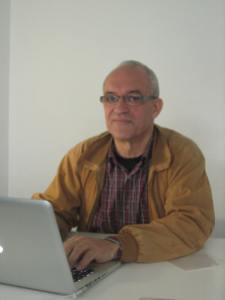
Here is an excerpt from the article I wrote for THE REVIEW of Villa Mediterranée, translated into English by Dimitris Saltabassis.
In a perceptive overview of the Greek cultural scene, Dimitra Kouzi talks about the current mix of gloom and hope in a country in a state of deep economic crisis.
Beyond the news and headlines, art reflects the political, economic and everyday-life changes. Hasn't art in Greece been always in crisis? What's the difference now? "Art is inconsequential without our insistence. It seems that there is a need for it; this explains its survival," says artist Alexandros Mistriotis.
Artists work in a stifling atmosphere. "Everybody works more or less for free, yet there is great solidarity for everything," Art Historian Denys Zacharopoulos, Director of the Macedonian Museum of Contemporary Art, adds.
There is such proliferation of art events that one is hard-pressed for choice. And that means new venues. In addition to the expansion and renovation of the National Gallery in Athens, currently in progress, and the establishment of the National Museum of Contemporary Art, housed in the former Fix brewery, after many years of temporary housing, there are currently in operation about ten new independent art venues in Athens, often under the aegis of the municipality. Run by people who have studied abroad and have an international network of contacts, they provide the infrastructure for an independent art scene to flourish, hosting work by young artists in a variety of genres (theatre, music, visual arts, architecture, graphic and fashion design, workshops). Housed in a historical building, the former headquarters of the extremely popular magazine Romanzo in a central Athens area more reminiscent of a ghetto in recent times, the BIOS – Romanzo creative hotbed provides office space for creative young people and start-ups focusing on technology, art and culture, while also hosting exhibitions, concerts, performances, collective actions, workshops and seminars. The BIOS team managed to turn over the image and population makeup of the whole area. "All young people find it hard to turn their ideas into practice in today's circumstances. Perhaps people think more in terms of cooperation now; a feeling of collectivity may have become more developed. The need to participate in the commons is more intensely and consciously felt."
Amidst the crisis, Rosie Diamantaki decided to establish an experimental art venue – Anamesa Art Space. She enables budding artists to take their first steps, irrespective of the commercial appeal of what they do. She also supports upcoming musicians and showcases projects that combine music and the visual arts. "There is a new generation of artists in all genres who make a new proposition in Greece. In the visual arts, there are young artists' teams which join larger groups or run their own spaces, working on projects featuring public interaction with a view to increasing the participation of art in a public dialogue, rather than being galleries in the strict sense, such as Arbit City Group, or 3137." She points out that, "Even Art Athina, the largest foire in Greece has introduced Platform Project, an initiative for young artists."
.... If you want to read the complete article (in French or English) you can order a copy of the the magazine or contact me.

THE REVIEW
Halfway between a book and a magazine, the Villa Méditerranée’s The Review is, in its own way, an invitation to a new space to discover and examine the current issues of the Mediterranean world. In addition to the Villa’s missions, the Review seeks to bring together different interpretations of today’s most critical issues. This second issue questions the sustainability of a mobile world, public space, memory and conflicts, youth and identity issues, as well as the challenges facing tourism. It is available in English and in French.

